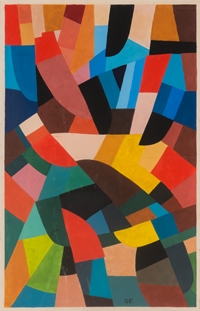Otto Freundlich
Otto Freundlich is one of the earliest representatives of German abstract art. In addition to the genre of painting and sculpture, he was also the author of art-theoretical and philosophical texts under the influence of humanistic artistic creation. His compositions represent the ideal of a social structure in which the individual is in dialogue with the whole. Freundlich saw art as a universally connecting language. The close contact with many other German artists was prevented in the last years of his life when the National Socialists came to power. In addition, his works have been removed from German museums. In 1943 the artist was denounced as a Jew and deported to the Majdanek concentration camp, where he was murdered on the day of his arrival.
born 1878 in Stolp, Poland
1907-1908 studies in Berlin
1907 Private art lessons in Berlin with Lothar von Kunowski and Lovis Corinth
1908 First trip to Paris, meets the avant-garde artistic circles, lives in Montmartre with Pablo Picasso and Georges Braque
1910-1914 Long stays in Paris
1912-1913 Participation in the exhibitions of the New Secession in Berlin, the Cologne Sonderbund and the First German Autumn Salon
1918 member of the November group
1919 Organized the first Dada exhibition in Cologne with Johannes Theodor Baargeld and Max Ernst
1925-1934 Return to Paris, member of the artists’ association Abstraction-Création
1943 Deportation to Majdanek concentration camp
died in 1943 in a concentration camp in Lublin-Majdanek, Poland

